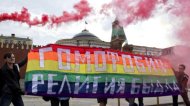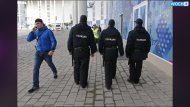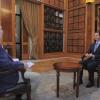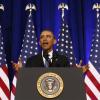
Update: On Jan. 9, investigators were looking into the unexplained killings of six men, whose bodies were found in four cars in the Caucasus Mountains region. Bombs were also placed near three of those cars, investigators said, though only one detonated. Pyatigorsk, the city where the six men’s bodies were found, is also relatively close to Sochi, just 300 km by air.
Terrorism, it is said, can be understood as a bloody form of communication, and at least some messages in late December’s bombings in Volgograd, Russia, were chillingly clear. The insurgents based in the North Caucasus are back at war—obviously— and, in the eyes of the terrorists, civilians in Russia’s major cities are once again fair game. The twin attacks on a train station and trolley bus claimed 34 lives in the city formerly known as Stalingrad, a place that, over the decades, has surely seen its share of tragedy.Unlike other recent attacks stemming from the Kremlin’s battle against Islamists in the country’s bullet-riddled south, the December bombings were meant in large measure for international consumption. And, for an outside world looking on in horror, it took a few days for their meaning to sink in. For months, the government of Vladimir Putin has been pouring guns and muscle into Russia’s southwestern corner to secure history’s most expensive Winter Olympics. Now, with two alarmingly simple suicide bombings in a city nearly 700 km from the site of the Games, the killers have sent a paroxysm of fear around the globe anyway. Pictures of the bus, its roof peeled back from the force of the blast, bodies lying all around, consumed newscasts. Moscow’s shiny-happy message about Sochi being the safest Olympics ever (more than 600 facilities under guard!) was quickly lost in the din.
MORE FROM MACLEAN'S:
- Silken Laumann’s shocking secret
- How David O. Russell hustled Hollywood
- What happens when your son tells you he’s really a girl
- Neil Young, the oil sands and the damage done
- Inside Amazon, the everything store
Those are precisely the sorts of questions the terrorists hope will preoccupy the world in the wake of its off-site attacks. With so many eyes and ears trained on Russia, the merest twitch anywhere in that vast land becomes a nail-biting news item and, as the recent bombings made clear, even an attack launched far from Fortress Sochi can spoil what Putin imagines will be a showcase of the resurgent, self-confident nation. “If there’s another attack closer to the start of the Games, especially closer to the site itself, then that becomes the story,” predicts Mark Galeotti, a professor of global affairs at New York University and author of a book about Russia’s wars in Chechnya. “These become the Olympics held in the shadow of the volcano.”
Muslim insurgent groups in the Caucasus have stepped up their fight for independence, and Galeotti points to a string of secondary cities in the region where an attack would resonate as powerfully as those in Volgograd: Stavropol, Krasnodar and Rostov-on-Don. Those centres may be vulnerable, he says, because the security demands of Olympics in the post-9/11 era force even wealthy, well-policed countries to draw bodies and equipment from their farthest corners. The migration of officers to Vancouver-Whistler in 2010, for instance, was so profound that the RCMP deferred officers’ leave and holidays just to ensure it met minimum policing levels elsewhere in Canada.
Even if attackers never lay a glove on Sochi, the effects of another strike would be felt by athletes, reporters and spectators, because Moscow would be forced to step up protections within its 40,000-sq.-km security zone. Yes, the Kremlin has assured visitors that its safeguards won’t be intrusive. But, as Galeotti notes, Russian concepts of “intrusive” differ starkly from those in the West: “What happens,” he muses, “when the first Sicilian gets cavity-searched because some over-zealous officer thinks he looks like a Chechen? A few events like this can be quite catalytic.”
All of these risks become part of the calculation organizers make when planning Games security, says Bud Mercer, the now-retired assistant RCMP commissioner who headed the integrated unit in charge of security in Vancouver; at bottom, every decision represents some sort of trade-off. “You can make a venue into a rock-hard target. But, in doing so, you inevitably make something else softer.” About the best planners can do is coach security staff to behave civilly, Mercer says, while identifying potential off-site targets that terrorists might hit in lieu of, say, a crowded skating oval. In the months leading up to the Vancouver Games, for example, planners performed full-scale dry runs involving attacks on critical infrastructure such as dams, bridges and telecommunications systems, some of them hundreds of kilometres from the Olympic venues.
Six months ago in Ottawa, Mercer briefed a delegation from Sochi on those and other experiences and, while they seemed attentive, they asked surprisingly few questions, he recalls. Perhaps that’s because they had different scenarios, involving specific perpetrators, on their minds: Not long before that meeting, the de facto leader of the Islamist insurgency, Doku Umarov, had declared Sochi to be a central target for jihadists, calling for attacks on the “Satanist games” to be held on “the bones of our ancestors, on the bones of many, many Muslims who died and are buried on our territory along the Black Sea.”
Russian authorities pay close heed to such utterances from Umarov, a former Chechen field commander with grandiose dreams of an Islamic state reaching from the Black Sea to the Caspian. His organization, the so-called Caucasus Emirate, has been responsible for the most ruthless acts of terrorism of Russia’s post-Soviet era, including the 2004 Beslan school massacre, which saw 334 people killed, including 186 children; and the assault on a Moscow theatre that ended with the deaths of 130 hostages. It was in this cauldron that Putin forged his image as a strongman, overseeing a war in Chechnya that killed tens of thousands and left behind some formidable enemies of Russia—not the least of them Doku Umarov.
Still, it’s tempting in light of the recent attacks to consider Umarov’s pronouncement last July a sly feint, which all but ensured Moscow would further expose its underbelly by funnelling more resources toward Sochi. If so, it seems unlikely that Umarov will orchestrate some dramatic, command-and-control operation against an Olympic venue, or even an airport, opting instead for the modern, decentralized approach to terrorism. Like its al-Qaeda cousin, the Caucasus Emirate has been outsourcing its dirty work to self-starting martyrs such as Oksana Aslanova, the 26-year-old Turkmeni woman who blew herself up at the Volgograd train station.
That makes it hard to predict where the next bomb will go off, or, for that matter, who will flick the switch. And while Russian security sources have been quoted claiming to have sights on every “suspicious character” in the North Caucasus region, long-time Russia watchers are more convinced by the terrible logic behind the Volgograd strikes. Speaking last week to a nervous prospective visitor, Galeotti struggled to find words of reassurance, saying, “We’ll have to wait and see,” while noting darkly that “suicide bombers are by definition a finite resource.” Not the soothing notes a traveller might wish to hear, with Sochi’s Feb. 7 opening ceremony just weeks away. But, as ever in Russia, the pessimistic view seems the most realistic one.
You Might Like »
1 - 4 of 12
















No comments:
Post a Comment